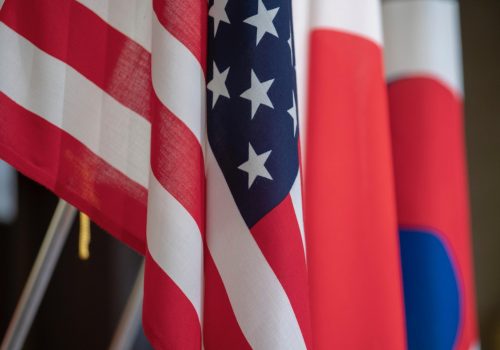A next-generation agenda for US-ROK-Japan cooperation
Trilateral cooperation among the United States, Japan, and South Korea has proved challenging over the years, owing largely to historical tensions. As a result, this project has sought perspectives from next-generation leaders of the three countries to define areas where targeted, flexible, and informal cooperative arrangements can provide clear mutual benefit to all. This issue brief calls for enhanced cooperation with likeminded allies and partners in order to counter shared challenges and advance mutual interests across the areas of security and defense, science and technology, and global public goods. Taken together, several essential themes emerge.
Future cooperation should center on tackling shared challenges including addressing an increasingly belligerent China through proactive yet constructive methods. In the security and defense sector, the three countries should prepare for Chinese economic reprisals by forming a united front. With regard to S&T, to protect against authoritarian threats, including those presented by China’s increasing technological prowess, the three countries should utilize multilateral frameworks, like IPEF, as tools to ensure the safety and security of scientific research and data. For public goods, the trilateral partnership can diversify away from Chinese supply chains by ally-shoring and information-sharing with trusted allies.
Given the historically fraught relationship between South Korea and Japan, the United States can act as a mediator to facilitate cooperation in areas of high benefit and low sensitivity. In security and defense, the trilateral partnership should address less-sensitive, shared security challenges, which include but are not limited to maritime incursions, crisis contingency planning, and cybersecurity. S&T can explore these new frontiers and safeguard free and fair principles for digital connectivity and data governance. Although public goods are less subject to domestic political pushback, the trilateral group’s actions are more likely to succeed if they are small, yet meaningful, such as implementing the democratic building blocks.
Lastly, trilateral cooperation requires both top-down institutionalization and bottom-up support from the general populace. With respect to defense and security, trilateral summits at the head-of-state level must be coupled with gaining public support. For S&T, the private sector can help advance collaboration, while the public sector helps each country remain in the bounds of domestic feasibility to prevent regional conflict. With global public goods, long-lasting trilateral progress requires coupling high-level government dialogues with civil society engagements.
Related content

Indo-Pacific Security Initiative
The Indo-Pacific Security Initiative works with US, allied, and partner governments and other key stakeholders to shape strategies and policies to mitigate the most important rising security challenges facing the region, including China’s growing threat to the international order and North Korea’s destabilizing nuclear weapons advancements. IPSI also addresses opportunities for cooperation in the region, such as transforming regional security architectures, harnessing emerging technologies, and developing new mechanisms for deterrence and defense cooperation.


